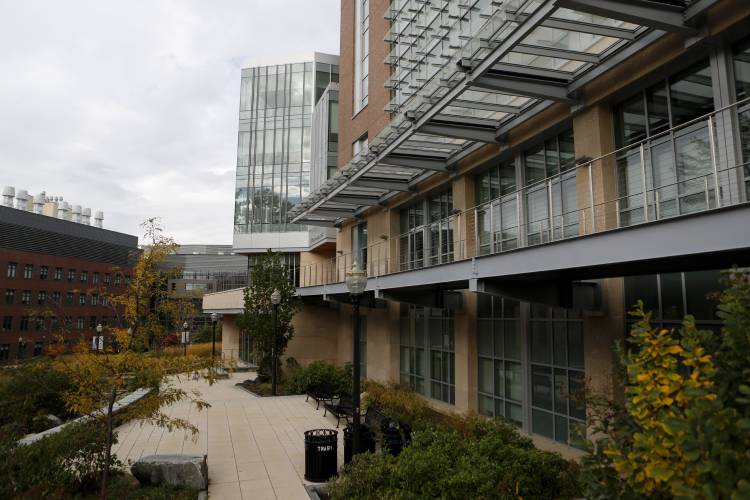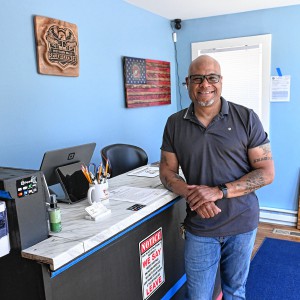From lab to world: UMass researchers land $5.5M grant to help translate work into products

An exterior view of the Institute for Applied Life Sciences at the University of Massachusetts Amherst. STAFF FILE PHOTO
| Published: 02-18-2024 10:01 AM |
AMHERST — Researchers at the University of Massachusetts Amherst will soon get help translating their work conducted in campus laboratories into solutions to real-world problems related to human health and well-being.
That’s the broad focus of a new $5.5 million grant received by a team from UMass’ Institute for Applied Life Sciences from the National Science Foundation through its Accelerating Research Translation award, or ART.
The grant, one of only 18 from a $100 million National Science Foundation-managed fund, is geared toward converting research ideas into viable products for tackling real-world challenges, according to Peter Reinhart, the founding director of the Institute for Applied Life Sciences (IALS). It is the only ART award in New England.
In addition to IALS, researchers from other UMass departments are part of the team, including the Technology Transfer Office, the Office of Research & Engagement and the Office of the Provost.
“Our research questions are very broad and they could be everything,” Reinhart said. “The central theme that all projects relate to is improving human health and well-being.”
Reinhart noted that the results of the individual projects may play out in various ways. They might lead, for example, to a therapy for a condition for which there is now no effective treatment, such as Alzheimer’s, Parkinson’s or Huntington’s diseases.
According to the Centers for Disease Control and Prevention, more than 6 million Americans are living with Alzheimer’s since 2021, and the number is projected to nearly triple to 14 million people by 2060.
Another application of research ideas could be diagnostic aids, Reinhart said.
Article continues after...
Yesterday's Most Read Articles
 Longtime Orange public servant Richard Sheridan dies at 78
Longtime Orange public servant Richard Sheridan dies at 78
 As I See It: Between Israel and Palestine: Which side should we be on, and why?
As I See It: Between Israel and Palestine: Which side should we be on, and why?
 Retired police officer, veteran opens firearms training academy in Millers Falls
Retired police officer, veteran opens firearms training academy in Millers Falls
 Deerfield’s Tilton Library expansion ‘takes a village’
Deerfield’s Tilton Library expansion ‘takes a village’
 Big turnout expected Sunday for 14th annual WMass Mother’s Day Half Marathon in Whately
Big turnout expected Sunday for 14th annual WMass Mother’s Day Half Marathon in Whately
 High Schools: Big sixth inning propels Franklin Tech past Smith Vocational (PHOTOS)
High Schools: Big sixth inning propels Franklin Tech past Smith Vocational (PHOTOS)
“For this type of disease, we don’t even know when people got injured, because there are no good diagnostic tests,” said Reinhart. “Sometimes we find people with Alzheimer’s that might have developed 10 years earlier.
“We started the concept of how to help potential patients learn more about the disease earlier, but need money to build infrastructure to make real goods,” Reinhart continued. For example, researchers will work on developing wearable electric devices that measure people’s blood pressure or other vital signs.
The four-year grant is part of a broad effort to help change the traditional role of universities by making investments to support translational research, particularly in laboratories and startups, Reinhart said.
“NSF endeavors to empower academic institutions to build the pathways and structures needed to speed and scale their research into products and services that benefit the nation,” National Science Foundation Director Sethuraman Panchanathan said in a statement.
Furthermore, additional training will be provided to prepare postdoctoral fellows and graduate students for careers related to translational research, as well as build a more varied and inclusive atmosphere in all aspects of the project via the networking of ART ambassadors from all participating institutions around the country.
“The students will benefit by being trained to be part of this innovation economy, and the products we produce are the real beneficiaries for larger society,” Reinhart said.
Karen Utgoff, director of venture development at the Institute for Applied Life Sciences, said the initiative would support the innovation economy in western Massachusetts, as well as encourage students seeking new businesses and, given the number of startup firms in the area, will most likely generate job opportunities.
Interim Provost Mike Malone, who’s also the senior vice chancellor for academic affairs, noted that the products the laboratories create may result in obtaining a patent or intellectual property. Obtaining a patent is one way to put research ideas into practice.
“If you discover something useful, but do not commercialize it, then no one is going to benefit from it,” Malone said.
The length of outcomes depends on the nature of different projects. Some projects — for example, a therapy for Alzheimer’s — may take many years owing to several laws that must be followed for safety and regulatory permission. However, certain initiatives, if built on software, might provide far faster results.
“We are still in our first week, and we are just a seven-day team right now, but we believe there is something that will come up in the next few months,” Utgoff said.
UMass Amherst Chancellor Javier Reyes commented that “the resources and nationwide network that this award brings to the campus will open new opportunities for our researchers to make a positive impact on society and will strengthen their ability to contribute to economic development in the region and beyond.”
Partner organizations in the effort include MassVentures, the Berkshire Innovation Center, Massachusetts Biomedical Initiatives and innovation accelerator Forge of Somerville.
Xinyi Yang writes from the Boston University State House Program.

 Heath native’s bill honoring fallen heroes introduced in Congress
Heath native’s bill honoring fallen heroes introduced in Congress Greenfield Notebook: May 9, 2024
Greenfield Notebook: May 9, 2024 Heath voters OK $1.6M town budget, school spending
Heath voters OK $1.6M town budget, school spending  New USDA offices in Greenfield to aid staffing increase, program expansion
New USDA offices in Greenfield to aid staffing increase, program expansion
